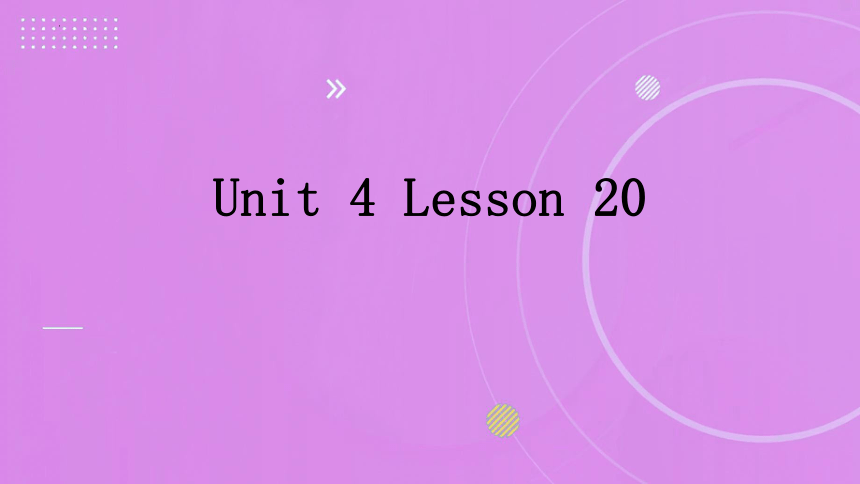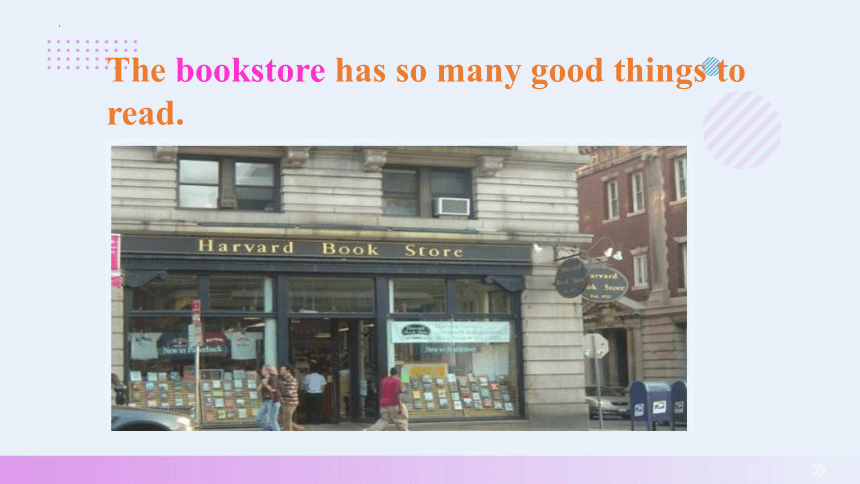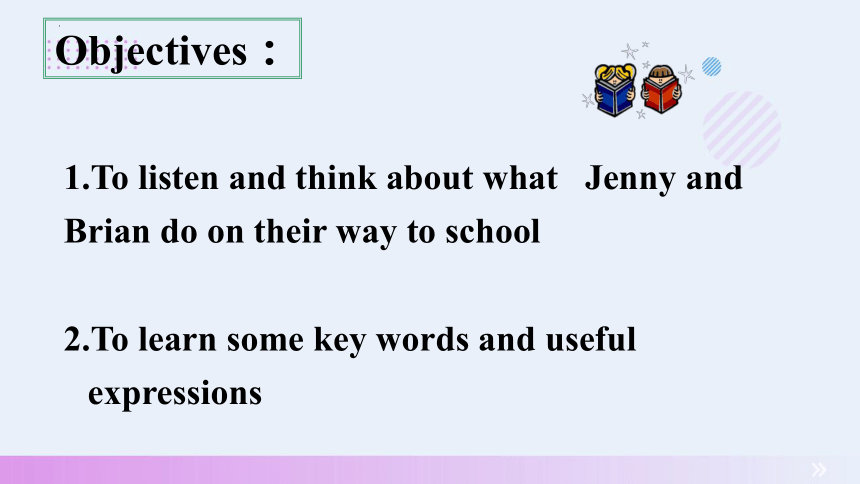Unit 4 Lesson 20 No Stopping! 课件 2023-2024学年冀教版英语八年级上册(共20张PPT)
文档属性
| 名称 | Unit 4 Lesson 20 No Stopping! 课件 2023-2024学年冀教版英语八年级上册(共20张PPT) |

|
|
| 格式 | pptx | ||
| 文件大小 | 2.4MB | ||
| 资源类型 | 教案 | ||
| 版本资源 | 冀教版 | ||
| 科目 | 英语 | ||
| 更新时间 | 2024-02-05 13:58:48 | ||
图片预览









文档简介
(共20张PPT)
Unit 4 Lesson 20
Think about it
1. How do you get to school every day
2. What places do you pass on the way
3. Do you stop anywhere
The bookstore has so many good things to read.
It's a bakery. We can buy bread,cakes, donuts and biscuits.
What places do you pass on your way to school
Think about it!
Look at the pictures. What places do
Jenny and Brian pass on their way to school
1.To listen and think about what Jenny and Brian do on their way to school
2.To learn some key words and useful expressions
Objectives:
Objectives
To learn to use the words and phrases correctly
go past show sb sth
take the bus on the way to
no+动名词或名词,意为“禁止……”。
使用语境:在英语中,no加上名词或动名词表示禁止性的警示语,通常用在公共场所,以提醒他人注意,相当于Don't do sth.意为“不准做某事。”。
No Smoking!
e.g.
Language points
No Photos!
No Parking!
on one's way to...在某人去……的路上
one's要与主语的人称一致。后接表示地点的副词here,there,home等时,to要省略。
e.g. On my way home,I saw a traffic accident.
在我回家的路上,我看见一起交通事故。
Language points
the way to... “去……的路”。
e.g. Could you please show me the way to Mr. Smith's house
请问你能指给我去史密斯先生家的路吗?
on one's way to...和the way to...中的to为介词,后跟名词、动名词或代词。
知识拓展
Fill in the blanks with the correct forms of the words in the box.
point cross neighbourhood past
1.I want to show you the ______________this morning.
2.“Do we go this way now?” asks Brian.He is ________ to the right.
3.They look left,then right.They ________ the street.
4.We will go ________ some of my favourite shops.
neighbourhood
pointing
cross
past
Let’s Do It!
Match the statements on the left with the reasons on the right.
We didn't have fun
The teacher is angry
I often go to the library
You can't go by yourself
because I like reading.
because you're not old enough.
because Peter is late for school.
because he went mountain climbing.
because the weather was bad.
He is tired
Let’s Do It!
Li Ming:Hi,Wang Wei! How do you usually get to school
Wang Wei:I usually walk to school. Sometimes I go to school by bike.
Li Ming:What places do you pass on your way to school
Wang Wei:I go past a bookstore, a bakery,a toy store and a flower shop..
Li Ming:What are your favourite places
Wang Wei:The bookstore and the toy store.
Li Ming:Do you stop anywhere Why
Wang Wei:Sometimes I will stop. I will go to buy some books. Books are my favourite
1. No stopping!
No + n. / v-ing (多用于公共场所)表示禁止性的警语
e.g. No smoking! 禁止吸烟!No fishing! 禁止钓鱼!
No parking! 禁止停车!No photos! 禁止拍照!
2. Jenny and Brian are on their way to school.
on one’s/ the way to 在某人去··· ···的路上
e.g. ① On my way to library, I met Jenny.
② I’m on the way to school.
③ On their way home, they bought the presents.
language points.
3. They are walking because it’s sunny.
此处because引导原因状语从句,主句:they are walking 表示结果,在英语中,because 和so不能同时出现。此句的同义句是:
4. Usually we take the school bus.
take a bus
by bus
乘坐汽车,动词短语,作谓语;
乘汽车,介词短语,作状语。
eg. I often take a bus to school.=
I often go to school by bus.
It's sunny so they are walking.
5. He is pointing to the right.
6.Cross the street.
point to (远距离)指着;指向
point at (近距离)指着
e.g. ①They are pointing to the hill.
② It is wrong to point at people with a fingure.
cross作动词,意为“穿过,越过,”指从表面上穿过,相当于go across,across 为介词。
Summary
Words: corner, turn, cross, remember
Phrases: no+动名词/名词, on one’s way to…, take the school bus, point to…
Sentences:
1.No stopping!
2.It has so many good things to read.
3.What place do you pass on your way to school
We will go past some of my favourite shops.
4.He is pointing to the right.
Homework
1. Think about what do you do on your way to school. Then make up a dialogue.
2.Preview Unit 4-Lesson 21 .
Thank you!
Unit 4 Lesson 20
Think about it
1. How do you get to school every day
2. What places do you pass on the way
3. Do you stop anywhere
The bookstore has so many good things to read.
It's a bakery. We can buy bread,cakes, donuts and biscuits.
What places do you pass on your way to school
Think about it!
Look at the pictures. What places do
Jenny and Brian pass on their way to school
1.To listen and think about what Jenny and Brian do on their way to school
2.To learn some key words and useful expressions
Objectives:
Objectives
To learn to use the words and phrases correctly
go past show sb sth
take the bus on the way to
no+动名词或名词,意为“禁止……”。
使用语境:在英语中,no加上名词或动名词表示禁止性的警示语,通常用在公共场所,以提醒他人注意,相当于Don't do sth.意为“不准做某事。”。
No Smoking!
e.g.
Language points
No Photos!
No Parking!
on one's way to...在某人去……的路上
one's要与主语的人称一致。后接表示地点的副词here,there,home等时,to要省略。
e.g. On my way home,I saw a traffic accident.
在我回家的路上,我看见一起交通事故。
Language points
the way to... “去……的路”。
e.g. Could you please show me the way to Mr. Smith's house
请问你能指给我去史密斯先生家的路吗?
on one's way to...和the way to...中的to为介词,后跟名词、动名词或代词。
知识拓展
Fill in the blanks with the correct forms of the words in the box.
point cross neighbourhood past
1.I want to show you the ______________this morning.
2.“Do we go this way now?” asks Brian.He is ________ to the right.
3.They look left,then right.They ________ the street.
4.We will go ________ some of my favourite shops.
neighbourhood
pointing
cross
past
Let’s Do It!
Match the statements on the left with the reasons on the right.
We didn't have fun
The teacher is angry
I often go to the library
You can't go by yourself
because I like reading.
because you're not old enough.
because Peter is late for school.
because he went mountain climbing.
because the weather was bad.
He is tired
Let’s Do It!
Li Ming:Hi,Wang Wei! How do you usually get to school
Wang Wei:I usually walk to school. Sometimes I go to school by bike.
Li Ming:What places do you pass on your way to school
Wang Wei:I go past a bookstore, a bakery,a toy store and a flower shop..
Li Ming:What are your favourite places
Wang Wei:The bookstore and the toy store.
Li Ming:Do you stop anywhere Why
Wang Wei:Sometimes I will stop. I will go to buy some books. Books are my favourite
1. No stopping!
No + n. / v-ing (多用于公共场所)表示禁止性的警语
e.g. No smoking! 禁止吸烟!No fishing! 禁止钓鱼!
No parking! 禁止停车!No photos! 禁止拍照!
2. Jenny and Brian are on their way to school.
on one’s/ the way to 在某人去··· ···的路上
e.g. ① On my way to library, I met Jenny.
② I’m on the way to school.
③ On their way home, they bought the presents.
language points.
3. They are walking because it’s sunny.
此处because引导原因状语从句,主句:they are walking 表示结果,在英语中,because 和so不能同时出现。此句的同义句是:
4. Usually we take the school bus.
take a bus
by bus
乘坐汽车,动词短语,作谓语;
乘汽车,介词短语,作状语。
eg. I often take a bus to school.=
I often go to school by bus.
It's sunny so they are walking.
5. He is pointing to the right.
6.Cross the street.
point to (远距离)指着;指向
point at (近距离)指着
e.g. ①They are pointing to the hill.
② It is wrong to point at people with a fingure.
cross作动词,意为“穿过,越过,”指从表面上穿过,相当于go across,across 为介词。
Summary
Words: corner, turn, cross, remember
Phrases: no+动名词/名词, on one’s way to…, take the school bus, point to…
Sentences:
1.No stopping!
2.It has so many good things to read.
3.What place do you pass on your way to school
We will go past some of my favourite shops.
4.He is pointing to the right.
Homework
1. Think about what do you do on your way to school. Then make up a dialogue.
2.Preview Unit 4-Lesson 21 .
Thank you!
同课章节目录
- Unit 1 Me and My Class
- Lesson 1 Back to School!
- Lesson 2 Many Faces, One Picture
- Lesson 3 Getting to Know You!
- Lesson 4 Best Friends
- Lesson 5 Meet Ms. Liu
- Lesson 6 Jenny's Week
- Unit 2 My Favourite School Subject
- Lesson 7 Don't Be Late for Class!
- Lesson 8 E-mail Helpers!
- Lesson 9 I Don't Want to Miss Geography !
- Lesson 10 Looking for Lisa
- Lesson 11 Lily Learns about China !
- Lesson 12 Karen's Hair Stood Up!
- Unit Review
- Unit 3 Families Celebrate Togethe
- Lesson 13 I Love Autumn
- Lesson 14 Happy Memories
- Lesson 15 A Present for Li Ming!
- Lesson 16 Happy Thanksgiving!
- Lesson 17 Presents from Canada!
- Lesson 18 Li Ming's Birthday
- Unit Review
- Unit 4 My Neighbourhood
- Lesson 19 The Best Neighourhood
- Lesson 20 No Stopping!
- Lesson 21 Eat a Donut and Turn Right
- Lesson 22 I Like My Neighbourhood
- Lesson 23 People in My Neighbourhood
- Lesson 24 I Need a Map!
- Unit Review
- Unit 5 My Future
- Lesson 25 I Want to Be a Teacher!
- Lesson 26 What Will I Be ?
- Lesson 27 What's Your Advice?
- Lesson 28 Rich or Poor? It Doesn't Matter!
- Lesson 29 Our Ambitions and Dreams
- Lesson 30 A Famous Friend?
- Unit Review
- Unit 6 Go With Transportation !
- Lesson 31 How Do You Travel ?
- Lesson 32 Trains Go Faster !
- Lesson 33 Life on Wheels
- Lesson 34 Flying Donuts
- Lesson 35 Future Transportation
- Lesson 36 Clean Cars ?
- Unit Review
- Unit 7 Enjoy Your Hobby
- Lesson 37 What's Your Hobby ?
- Lesson 38 Hobbies Are Fun!
- Lesson 39 Danny's Hobby
- Lesson 40 What's Paul's Hobby?
- Lesson 41 Show and Tell!
- Lesson 42 The New Club
- Unit Review
- Unit 8 Celebrating Me
- Lesson 43 What Makes You Unique?
- Lesson 44 Georgia Plays Basketball
- Lesson 45 Be Yourself !
- Lesson 46 My Dream
- Lesson 47 I Made It !
- Lesson 48 Li Ming's Report
- Unit Review
